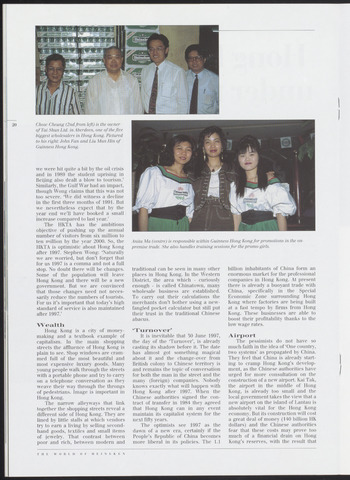Chow Cheung (2nd from left) is the owner
ofTai Shun Ltd. in Aberdeen, one of the five
biggest wholesalers in Hong Kong. Pictured
to his right: John Fan and Liu Man Hin of
Guinness Hong Kong.
we were hit quite a bit by the oil crisis
and in 1989 the student uprising in
Beijing also dealt a blow to tourism.'
Similarly, the Gulf War had an impact,
though Wong claims that this was not
too severe. 'We did witness a decline
in the first three months of 1991. But
we nevertheless expect that by the
year end we'll have booked a small
increase compared to last year.'
The HKTA has the ambitious
objective of pushing up the annual
number of visitors from six million to
ten million by the year 2000. So, the
HKTA is optimistic about Hong Kong
after 1997. Stephen Wong: 'Naturally
we are worried, but don't forget that
for us 1997 is a comma and not a full
stop. No doubt there will be changes.
Some of the population will leave
Hong Kong and there will be a new
government. But we are convinced
that those changes need not neces
sarily reduce the numbers of tourists.
For us it's important that today's high
standard of service is also maintained
after 1997.'
Wealth
Hong Kong is a city of money-
making and a textbook example of
capitalism. In the main shopping
streets the affluence of Hong Kong is
plain to see. Shop windows are cram
med full of the most beautiful and
most expensive luxury goods. Many
young people walk through the streets
with a portable phone and try to carry
on a telephone conversation as they
weave their way through the throngs
of pedestrians. Image is important in
Hong Kong.
The narrow alleyways that link
together the shopping streets reveal a
different side of Hong Kong. They are
lined by little stalls at which vendors
try to earn a living by selling second
hand goods, textiles and small items
of jewelry. That contrast between
poor and rich, between modern and
traditional can be seen in many other
places in Hong Kong. In the Western
District, the area which - curiously
enough - is called Chinatown, many
wholesale business are established.
To carry out their calculations the
merchants don't bother using a new
fangled pocket calculator but still put
their trust in the traditional Chinese
abacus.
'Turnover'
It is inevitable that 50 June 1997,
the day of the 'Turnover', is already
casting its shadow before it. The date
has almost got something magical
about it and the change-over from
British colony to Chinese territory is
and remains the topic of conversation
for both the man in the street and the
many (foreign) companies. Nobody
knows exactly what will happen with
Hong Kong after 1997. When the
Chinese authorities signed the con
tract of transfer in 1984 they agreed
that Hong Kong can in any event
maintain its capitalist system for the
next fifty years.
The optimists see 1997 as the
dawn of a new era, certainly if the
People's Republic of China becomes
more liberal in its policies. The 1.1
billion inhabitants of China form an
enormous market for the professional
companies in Hong Kong. At present
there is already a buoyant trade with
China, specifically in the Special
Economic Zone surrounding Hong
Kong where factories are being built
at a fast tempo by firms from Hong
Kong. These businesses are able to
boost their profitability thanks to the
low wage rates.
Airport
The pessimists do not have so
much faith in the idea of 'One country,
two systems' as propagated by China.
They feel that China is already start
ing to cramp Hong Kong's develop
ment, as the Chinese authorities have
urged for more consultation on the
construction of a new airport. Kai Tak,
the airport in the middle of Hong
Kong, is already too small and the
local government takes the view that a
new airport on the island of Lantau is
absolutely vital for the Hong Kong
economy. But its construction will cost
a great deal of money (140 billion HK
dollars) and the Chinese authorities
fear that these costs may prove too
much of a financial drain on Hong
Kong's reserves, with the result that
T H K W O It L D or H E 1 N K K E N

